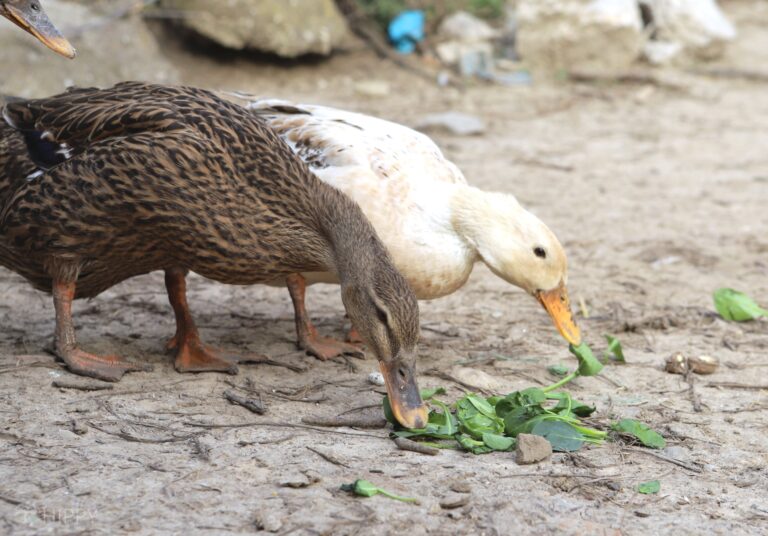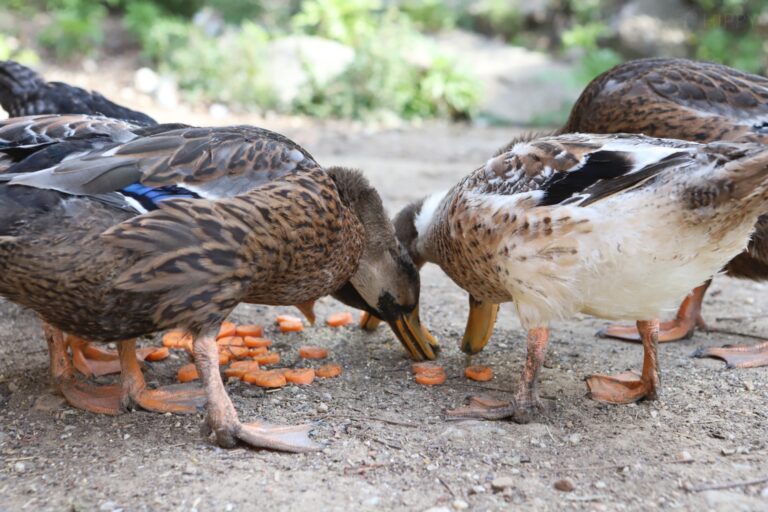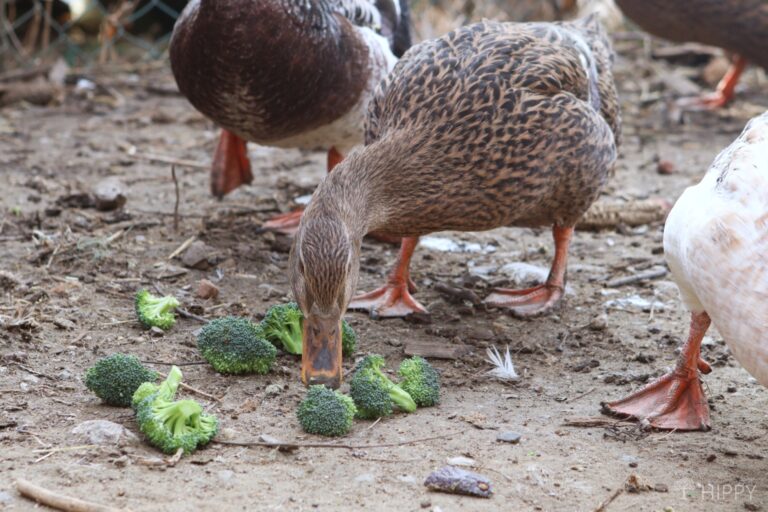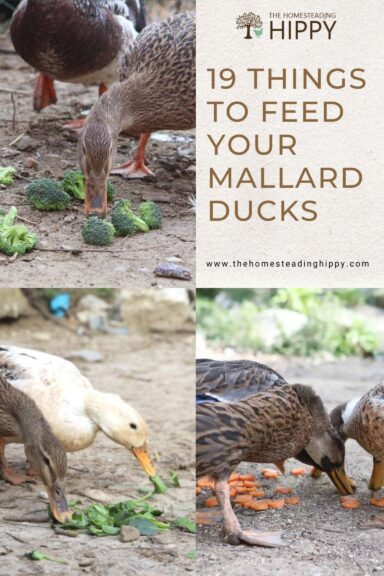Ducks lately have been gaining popularity over chickens as the preferred poultry for homesteaders. Compared to their cousins, ducks tend to live longer, stay healthier, and are just as versatile as chickens are, capable of cranking out hundreds of rich, indulgent eggs every year and also supplying you with succulent and truly delicious meat.

And when it comes to keeping domestic ducks, Mallards are some of the most popular. They are, in fact, what most people think of when they think of ducks!
From their adorable quacking to their gorgeous coloration, Mallards are adaptable, productive, and a great choice for anyone getting started with keeping their own flock of waterfowl.
But you’ll need to know what to feed them, and so to help you do that, I’m bringing you a list of 19 foods that are perfect for Mallards.
Duckweed
Duckweed, as you might have guessed based on the name alone, is a mainstay food for all kinds of ducks. It’s named so because ducks love the stuff.
This naturally occurring and highly nutritious plant is found growing in all sorts of natural water sources, and it’s something that you can cultivate or buy for your flock.
Water Lilies
Water lilies are another commonly eaten aquatic plant that your Mallards will like, particularly the leaves and the large seeds. It gives a fair bit of vitamin and mineral content compared to duckweed, but it is still healthy and easily digestible for ducks.
Cattails
These peculiar, hot dog-shaped plants are a common sight near marshes, ponds, and lakes, and ducks can eat particular parts, especially young, tender leaves, and roots. The compact, dry, dense flowering part should be avoided, though.
Left to their own devices, ducks will ignore it, but you don’t need to go out of your way to serve it to them.
Leaves
Ducks eat all kinds of leaves, and pretty much everything will be on the menu as long as it’s fresh and flavorful. Some favorites that many ducks, including Mallards, like to eat are oak, elm, maple, and apple leaves.
Just a quick note on that, some types of leaves, namely dried cherry tree leaves that are damaged on the branch, may contain harmful or sickening levels of toxic compounds and should be avoided. Always investigate the safety of trees on and around your property.
Grass
Grass is another favorite food of ducks, and they’re always happy to munch on it, especially young blades, wherever they find it growing. It is easily digestible and helps keep their digestive tract clear as it is a great source of fiber for them.
Leafy Vegetables
Ducks can eat all kinds of leafy vegetables, including various kinds of lettuce and cabbage along with leafy greens off of other vegetables like carrot, beet, radish, and similar tops or crowns. As long as the leaves aren’t tough and spiny like those on a pineapple, they are fair game!

Carrots
Carrots aren’t something that most ducks will usually get access to in the wild, preferring instead to eat those delicious, tender greens.
If you make it a point to dice up carrots into tiny pieces or shred them, your Mallards will love them. Take care to avoid giving them larger chunks, though, because they can be a choking hazard and cause crop impaction problems.
Potatoes
Potatoes are another veggie that might seem like a strange choice for ducks, and indeed they should not eat any green part of the plant, but some gently cooked potato that is mashed or chopped into small bits is a nutritious and tasty option for them.
Apples
Ducks don’t need a ton of sugar in their diet, and that means they don’t need much fruit, but they can have some wholesome offerings like apples. Remove the seeds and shred the flesh or cut it up into tiny pieces prior to serving. Your flock will gobble it up in no time!
Cherries
Cherries are another great source of energy and an occasional treat for Mallards. They’re easily digestible, but be sure to remove the pit, which has toxic compounds that are precursors to cyanide. It can also be a choking hazard. One or two are unlikely to hurt ducks, but you just shouldn’t take the chance…
Grapes
Ducks absolutely love grapes, all kinds. Red, white, green, black, they are all on the menu. Although the temptation is there to feed your flock grapes that are right off of the bunch, you are advised to slice them in half or even into quarters for larger varieties to prevent the risk of choking and crop problems.

Fish
Ducks, naturally, eat all kinds of tiny fish, like minnows. You can stock your own feeder pond or buy them just for giving to your birds. Fish are an especially important source of summer protein for Mallards.
Seeds
Ducks, like so many other bird species, love to eat seeds. They especially love seeds from aquatic plants, but they can also eat sunflower seeds and others that you feed to chickens or songbirds.
Just make sure that you give them in moderation because they are so calorie and nutrient-dense that they can cause ducks to gain unhealthy amounts of weight or even lead to nutritional imbalances.
Corn
Corn is a great high-energy feed for ducks in moderation. Too much can easily cause weight gain and digestive problems, but a little bit will provide them with tons of calories, minerals, and more.
Note that you always want to give your birds cracked corn if you can; whole, dried corn can cause a digestive tract blockage that might be fatal.
Other Grains
Other grains like barley, millet, oats, wheat, and the like are also suitable food for your Mallards although they don’t like it as much as corn, and they typically don’t have as many benefits.
But just as with corn, mind the quantity and only feed it as a supplement to their usual diet or when they need extra energy during the molt, when laying, or in the wintertime.
Insects
Ducks love insects, particularly flies, fly eggs, beetles, midges, and aquatic insects like water bugs, dragonfly nymphs, and more.
You can let your flock forage and find their own to eat, or buy them as a supplement to their diet. Basically, any insect that is suitable for feeding to waterfowl generally or gamebirds is fine for them.
Crustaceans
Shrimp, crayfish, and other aquatic creepy crawlies are some of Mallards’ favorite foods. You can stock a water source with them to keep yourself in a good supply, or if you have a pond or lake on your property, let your ducks forage for them on their own as long as you know it’s safe for them to be on the water.
Worms
Your Mallards are very much like every other bird when it comes to worms. They love them and will happily eat them up whenever and wherever they can find them. Like fish mentioned above, worms are also an important summer source of protein for Mallards, particularly.
Slugs and Snails
Another excellent source of animal protein, slugs, and snails alike are greatly loved by all kinds of ducks and especially Mallards.
They also happen to be expert slug hunters and will absolutely eradicate them from your property in time. If you’ve got problems with slugs tearing up your fruits, veggies, or decorative plants, your ducks will soon make that a thing of the past.

Tim is a farm boy with vast experience on homesteads, and with survival and prepping. He lives a self-reliant lifestyle along with his aging mother in a quiet and very conservative little town in Ohio. He teaches folks about security, prepping and self-sufficiency not just through his witty writing, but also in person.
Find out more about Tim and the rest of the crew here.
